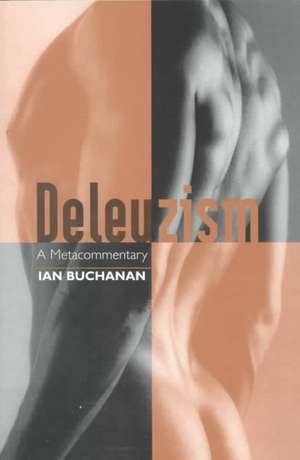Deleuzism – A Metacommentary
Autor Ian Buchananen Limba Engleză Paperback – 28 mai 2000
To show us how Deleuze's philosophy works, Buchanan begins with Melville's notion that "a great book is always the inverse of another book that could only be written in the soul, with silence and blood." Buchanan demonstrates that the figure of two books--one written in ink and the other written in blood--lies at the center of Deleuze's hermeneutics and that a special relation must be established in order to read the second book from the first. This relation is Deleuzism. By explicating elemental concepts in Deleuze--desire, flow, the nomad--Buchanan finds that, despite Deleuze's self-declared moratorium on dialectics, he was in several important respects a dialectician. In essays that address the "prehistory" of Deleuze's philosophy, his methodology, and the utopic dimensions of his thought, Buchanan extracts an apparatus of social critique that arises from the philosopher's utopian impulse.
"Deleuzism" is a work that will engage all those with an interest in the twentieth-century's most original philosopher.
Preț: 203.56 lei
Nou
Puncte Express: 305
Preț estimativ în valută:
38.95€ • 40.77$ • 32.42£
38.95€ • 40.77$ • 32.42£
Carte tipărită la comandă
Livrare economică 31 martie-14 aprilie
Preluare comenzi: 021 569.72.76
Specificații
ISBN-13: 9780822325482
ISBN-10: 0822325489
Pagini: 270
Dimensiuni: 157 x 235 x 17 mm
Greutate: 0.35 kg
Ediția:New.
Editura: MD – Duke University Press
ISBN-10: 0822325489
Pagini: 270
Dimensiuni: 157 x 235 x 17 mm
Greutate: 0.35 kg
Ediția:New.
Editura: MD – Duke University Press
Notă biografică
Textul de pe ultima copertă
"Buchanan's approach to Deleuze is entirely original. He gets outside of Deleuzianism and gives us a fresh view on his thought--not refuting it but rather seeing it from a different perspective and then using it in a different way."--Michael Hardt, Duke University
